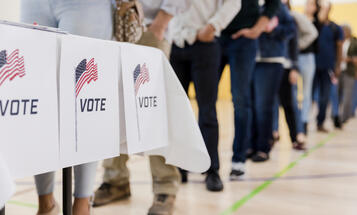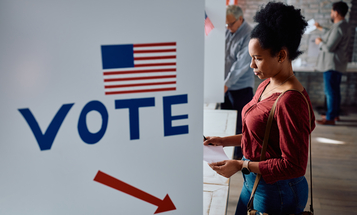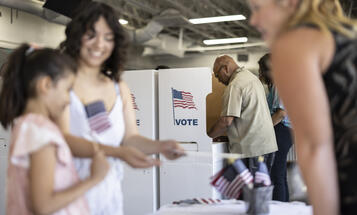
Voting Rights Is an LGBTQ Issue
June is Pride month, and it began, disappointingly, with the Supreme Court’s decision in Masterpiece Cakeshop, a dispute between a gay couple and a Christian baker who refused to serve them. The Court ruled in favor of the baker and declined to answer major constitutional questions that could have resolved long-simmering tensions between LGBTQ rights and assertions of religious freedom. This silence is likely to encourage laws that authorize faith-based discrimination against LGBTQ people. The close of Pride month – and the Supreme Court’s term – has unfortunately only brought more bad news when it comes to discrimination, with the Court overturning a preliminary injunction against Trump’s Islamophobic and xenophobic “travel ban” in Trump vs. Hawaii.
The Court’s decision in Husted v. APRI, decided a week after Masterpiece, is arguably just as dangerous to LGBTQ and other marginalized communities. Husted was a challenge to Ohio’s voter roll purges, brought by Demos under the National Voter Registration Act (NVRA). Even though the NVRA—which was enacted to increase the number of eligible voters by registering more women, people of color, people living with disabilities, low-income people, and veterans—prohibits states from removing people from the rolls when they don’t vote, the Court upheld an Ohio process that did just that. This validation of Ohio’s harmful “use it or lose it” treatment of a fundamental right creates the danger that other states will attempt similar schemes.
Purging practices and other voter suppression tactics—like limiting voter registration opportunities and establishing strict photo ID requirements—are part of a broader problem: Our democracy is under attack. Barriers to political participation are rooted in, and perpetuate, the social and economic exclusion of people of color and low-income people. (Other examples include gerrymandering, the campaign finance system, and felony disenfranchisement laws.) As a result, historically marginalized communities remain unable to build power and inform conversations around policies that directly affect them—on health care, affordable housing, education, labor, and more.
A demonstration of this is the disproportionate impact of voting restrictions on queer people of color and trans people. Strict voter ID laws, for example, are particularly burdensome for those who don’t identify or present as the gender marked on their identification documents; voter registration requirements can present similar impediments. Purging processes like the one at issue in Husted can thus double-penalize trans and gender non-conforming people:
- By purging them from the rolls because they have not voted. Often they don’t vote they can’t get to the polls or take time off work—the logistics of voting can be prohibitive for low-income people, and queer people of color and trans people are two of the most economically insecure populations in the country—or because their needs aren’t reflected in the agendas of the candidates on the ballot.
- By forcing them to go through the burdensome voter registration process all over again before they can cast their ballots.
Meanwhile, agencies that are especially likely to interact with LGBTQ people are failing to provide voter registration opportunities. Although the NVRA requires states to offer these opportunities to people who receive government benefits, several states have failed to comply with this mandate, keeping opportunities from the more than 25 percent of LGBTQ people who receive food stamps. And, while the NVRA allows states to offer voter registration to detained individuals by designating the relevant state agencies as voter registration agencies, most states have not done so – which hurts queer and trans people, and especially queer and trans people of color, who are disparately policed and thus more likely to spend time in jail.
To create a democracy that works for all LGBTQ people—and all Americans—we need to improve our voter registration systems. We can do this by promoting the widespread adoption of automatic voter registration (AVR) and continuing to fight voter roll purges. AVR would give the large percentage of LGBTQ people who receive public assistance the chance to register immediately when they apply for or renew their benefits. Challenging aggressive purging practices would mitigate the burdens of re-registering and preserve individuals’ constitutional right to vote, regardless of their socioeconomic circumstances. Such reforms would amplify LGBTQ voices in important policy debates and elect candidates who prioritize intersectional interests that align with those of queer communities.
Of course, far more is required to break free from systemic exclusion. Contextualizing democracy issues as part and parcel of LGBTQ rights will require conversations among queer communities that focus on the urgent, localized concerns of those communities, as well as conversations between democracy advocates and historically marginalized groups (a suggested framework for such conversations can be found here).
Though Pride is celebratory, it has also lately become something of a reckoning. People of color and trans people have long been ignored by mainstream queer culture. Despite the fact that Pride was founded because trans women of color rebelled against a police raid of a New York City gay bar almost 50 years ago, this history—and its subsequent erasure by white, cis activists—has only recently become part of the narrative of the protests and commemorations that occur throughout the month. In many ways, the re-positioning of Pride to focus on historically excluded communities parallels the aforementioned framings of voting rights. Now is the perfect time for LGBTQ groups to incorporate democracy issues into the introspective discussions that are already taking place about how to amplify the voices of trans people and queer people of color.
Justice Sonia Sotomayor’s dissenting opinion in Husted is a call to action: “Communities that are disproportionately affected by unnecessarily harsh registration laws should not tolerate efforts to marginalize their influence in the political process, nor should allies who recognize blatant unfairness stand idly by.” We must never stop interrogating how voting laws affect different demographic groups in different ways. LGBTQ perspectives are critical in understanding the present-day manifestations of democratic exclusion.



